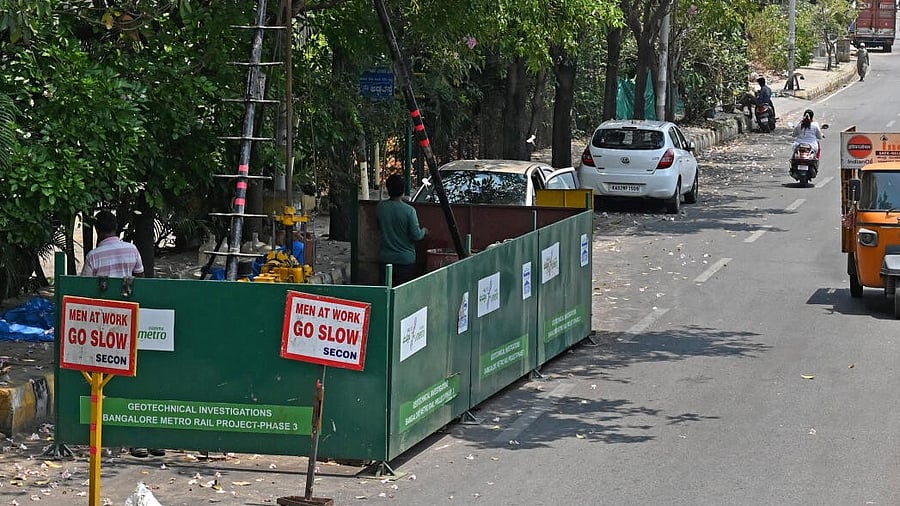
Geotechnical investigations for Phase 3 have been completed.
Credit: DH Photos
Bengaluru: Namma Metro now plans to begin construction on Phase 3 in June 2026, instead of the earlier target of January.
Pre-construction activities — land acquisition, utility shifting, and tree-cutting — are moving at a slower pace than expected, according to officials in the know.
In a presentation for the second and final environmental stakeholder meetings, which began on September 13 and will conclude on September 17, Bangalore Metro Rail Corporation Limited (BMRCL) announced that construction on Phase 3 would begin in June 2026 and operations in May 2031.
The 44.65-km Phase 3 will expand Bengaluru's metro network to 222.2 km.
A senior official indicated that tree-cutting approvals may come only by mid-2026.
On Tuesday, the BMRCL held the fourth session of its final environmental stakeholder meetings.
The official, who was present at the meeting, said the number of trees that would make for Phase 3 had been reduced from 11,137 to about 6,700.
The BMRCL has obtained the necessary permissions to remove or translocate about 1,100 trees along Corridor 1's Package 1 (JP Nagar 4th Phase to Mysuru Road, 10.88 km). "We have received the necessary approvals and begun work," he told DH.
Tree enumeration for Package 2 (Mysuru Road to Kanteerava Studio, 10.6 km) and Package 3 (Kanteerava Studio to Kempapura, 10.67 km) is still ongoing, he said.
"After enumeration, a tree expert committee will meet to review our requirement and we will receive an official memorandum," he added.
The BMRCL plans to undertake compensatory afforestation within the city limits, planting 10 native trees for every affected tree, he stated.
The official said tree-cutting approvals usually come in a phased manner, in line with groundwork requirements.
"Land acquisition, tree-cutting and utility shifting have to be in sync for groundwork to start," he said.
As per the environmental impact assessment of Phase 3, the loss of tree cover, along with dust generated during excavation, material transport and construction activities, as well as emissions from diesel generators, will likely worsen the environmental situation for areas in southern, western and northwestern Bengaluru.
To mitigate these effects, the BMRCL has proposed compensatory afforestation under a Rs 43.53-crore environmental monitoring plan.
Dattatraya T Devare, of the nonprofit Bangalore Environment Trust, who attended Tuesday's meeting, emphasised the need to revise the Detailed Project Report (DPR) after the state cabinet approved the Rs 9,700-crore double-decker plan.
Corridor 1 — JP Nagar 4th Phase to Kempapura — will have a 28.486-km flyover below the metro line. Corridor 2 will include a similar 8.635-km flyover from Hosahalli to Kadabagere along Magadi Road.
"This (double-decker plan) is a major change... the DPR needs to be thoroughly revised," he wrote to the BMRCL on September 15.
Stating that citizens cannot give meaningful suggestions without going through the revised DPR or its executive summary, Devare asked the BMRCL to keep public consultations on hold until then.